哥伦比亚诉欧盟香蕉案
国外确立法人人格否定制度的案例
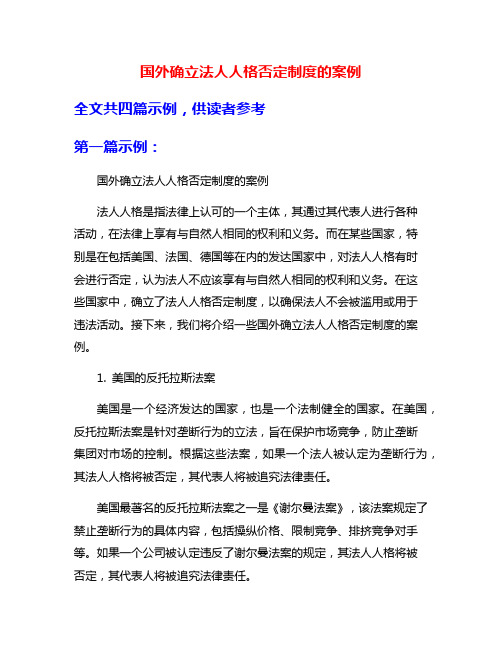
国外确立法人人格否定制度的案例全文共四篇示例,供读者参考第一篇示例:国外确立法人人格否定制度的案例法人人格是指法律上认可的一个主体,其通过其代表人进行各种活动,在法律上享有与自然人相同的权利和义务。
而在某些国家,特别是在包括美国、法国、德国等在内的发达国家中,对法人人格有时会进行否定,认为法人不应该享有与自然人相同的权利和义务。
在这些国家中,确立了法人人格否定制度,以确保法人不会被滥用或用于违法活动。
接下来,我们将介绍一些国外确立法人人格否定制度的案例。
1. 美国的反托拉斯法案美国是一个经济发达的国家,也是一个法制健全的国家。
在美国,反托拉斯法案是针对垄断行为的立法,旨在保护市场竞争,防止垄断集团对市场的控制。
根据这些法案,如果一个法人被认定为垄断行为,其法人人格将被否定,其代表人将被追究法律责任。
美国最著名的反托拉斯法案之一是《谢尔曼法案》,该法案规定了禁止垄断行为的具体内容,包括操纵价格、限制竞争、排挤竞争对手等。
如果一个公司被认定违反了谢尔曼法案的规定,其法人人格将被否定,其代表人将被追究法律责任。
2. 法国的《劳工法典》法国是一个法制严谨的国家,对于劳工关系的法律制度也非常完善。
在法国,雇主和员工之间的劳动关系由《劳工法典》来规范,其中规定了各种劳动权利和义务。
根据《劳工法典》的规定,如果一个公司违反了劳动法的规定,导致员工权益受到损害,法院可以否定该公司的法人人格,追究其代表人的法律责任。
如果一个公司未按照法律规定支付员工工资,法院可以裁定否定该公司的法人人格,追究其代表人的法律责任。
总结在一些国家中,确立法人人格否定制度是为了保护市场竞争、维护员工权益、打击犯罪活动等方面的法律需要。
通过对法人人格的否定,可以避免法人被滥用或用于违法活动,维护公平竞争和社会秩序。
希望这些案例可以帮助我们更好地了解国外确立法人人格否定制度的重要性和必要性。
第二篇示例:国外确立法人人格否定制度的案例在国外,法人人格否定制度是一种法律机制,允许法院或立法机构剥夺公司等法人实体的法人地位,使其行为和责任与其背后的个人实体相连。
美国等5国诉欧共体香蕉案
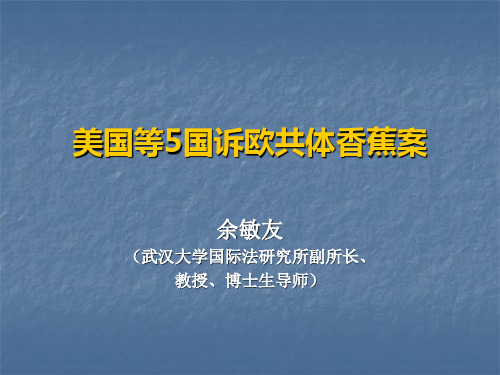
需要掌握的内容 美国的诉讼策略 WTO框架下争端解决的基本程序 WTO框架下争端解决的基本程序 WTO争端解决机制中的 反向协商一致” WTO争端解决机制中的“反向协商一致”决策方式 争端解决机制中的“ (GATT框架下与WTO框架下三次“香蕉案”的不同结 GATT框架下与WTO框架下三次 香蕉案” 框架下与WTO框架下三次“ 果说明了什么?) 果说明了什么?)
引言
美国等5国诉欧共体香蕉案, WTO自1995年初成立以来最 美国等5国诉欧共体香蕉案,是WTO自1995年初成立以来最 引人瞩目的“十年贸易大案”。 引人瞩目的“十年贸易大案” 其所涉实体法与程序法问题之广之深、所耗时间之久、所 其所涉实体法与程序法问题之广之深、所耗时间之久、 涉国家之多、有关专家小组和上诉机构报告篇幅之大,堪 涉国家之多、有关专家小组和上诉机构报告篇幅之大, 称史无前例。该案案情复杂,扑朔迷离,案中有案,险象 称史无前例。该案案情复杂,扑朔迷离,案中有案, 环生。争端各方斗智斗法,尤其是欧共体和美国这两大贸 环生。争端各方斗智斗法, 易巨头利用WTO规则相互较量、攻守自如,引人入胜, 易巨头利用WTO规则相互较量、攻守自如,引人入胜,不 WTO规则相互较量 仅展示了WTO争端解决机制的强项和弱项, 仅展示了WTO争端解决机制的强项和弱项,而且暴露了欧 WTO争端解决机制的强项和弱项 共体和美国这两个WTO的超级成员对WTO 共体和美国这两个WTO的超级成员对WTO多边贸易体制政策 WTO的超级成员对WTO多边贸易体制政策 的真面目,还有助于我们进一步认清WTO WTO对我国带来的挑 的真面目,还有助于我们进一步认清WTO对我国带来的挑 战与机会。 战与机会。
1998年12月15日 欧共体根据DSU第21条第 1998年12月15日,欧共体根据DSU第21条第5款,要求DSB设 根据DSU 条第5 要求DSB DSB设 立专家小组,以解释DSU 21条第 DSU第 条第5 立专家小组,以解释DSU第21条第5款。 1998年12月18日 厄瓜多尔也根据DSU第21条第 1998年12月18日,厄瓜多尔也根据DSU第21条第5款要求设 也根据DSU 条第5 立专家小组, 立专家小组,审议欧共体香蕉进口体制修正条例是否符合 WTO规则。 WTO规则。 规则 1999年 1999年1月11日,美国、危地马拉、洪都拉斯、巴拿马向 11日 美国、危地马拉、洪都拉斯、巴拿马向 DSB主席提交反对欧共体要求的正式信件。 DSB主席提交反对欧共体要求的正式信件。 主席提交反对欧共体要求的正式信件 1999年 1999年1月12日,DSB应厄瓜多尔和欧共体请求根据DSU第21 12日 DSB应厄瓜多尔和欧共体请求根据DSU第 应厄瓜多尔和欧共体请求根据DSU 条第5款分别设立专家小组, 条第5款分别设立专家小组,审查香蕉进口体制修正条例是 否符合WTO规则的问题。 否符合WTO规则的问题。 WTO规则的问题
美欧香蕉大战
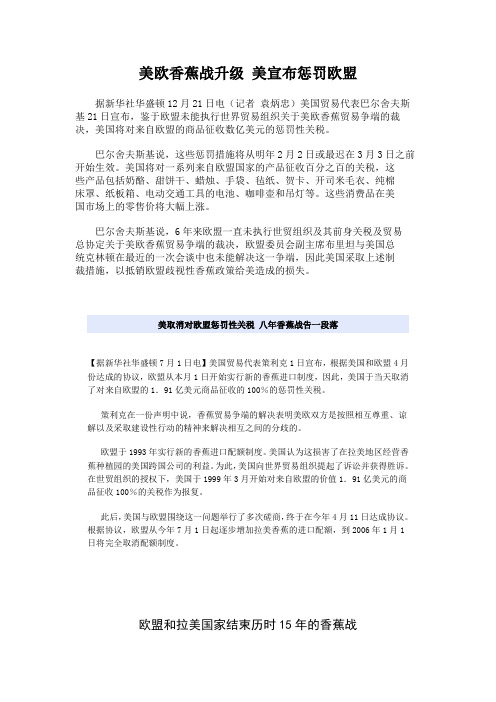
美欧香蕉战升级美宣布惩罚欧盟据新华社华盛顿12月21日电(记者袁炳忠)美国贸易代表巴尔舍夫斯基21日宣布,鉴于欧盟未能执行世界贸易组织关于美欧香蕉贸易争端的裁决,美国将对来自欧盟的商品征收数亿美元的惩罚性关税。
巴尔舍夫斯基说,这些惩罚措施将从明年2月2日或最迟在3月3日之前开始生效。
美国将对一系列来自欧盟国家的产品征收百分之百的关税,这些产品包括奶酪、甜饼干、蜡烛、手袋、毡纸、贺卡、开司米毛衣、纯棉床罩、纸板箱、电动交通工具的电池、咖啡壶和吊灯等。
这些消费品在美国市场上的零售价将大幅上涨。
巴尔舍夫斯基说,6年来欧盟一直未执行世贸组织及其前身关税及贸易总协定关于美欧香蕉贸易争端的裁决,欧盟委员会副主席布里坦与美国总统克林顿在最近的一次会谈中也未能解决这一争端,因此美国采取上述制裁措施,以抵销欧盟歧视性香蕉政策给美造成的损失。
美取消对欧盟惩罚性关税八年香蕉战告一段落【据新华社华盛顿7月1日电】美国贸易代表策利克1日宣布,根据美国和欧盟4月份达成的协议,欧盟从本月1日开始实行新的香蕉进口制度,因此,美国于当天取消了对来自欧盟的1.91亿美元商品征收的100%的惩罚性关税。
策利克在一份声明中说,香蕉贸易争端的解决表明美欧双方是按照相互尊重、谅解以及采取建设性行动的精神来解决相互之间的分歧的。
欧盟于1993年实行新的香蕉进口配额制度。
美国认为这损害了在拉美地区经营香蕉种植园的美国跨国公司的利益。
为此,美国向世界贸易组织提起了诉讼并获得胜诉。
在世贸组织的授权下,美国于1999年3月开始对来自欧盟的价值1.91亿美元的商品征收100%的关税作为报复。
此后,美国与欧盟围绕这一问题举行了多次磋商,终于在今年4月11日达成协议。
根据协议,欧盟从今年7月1日起逐步增加拉美香蕉的进口配额,到2006年1月1日将完全取消配额制度。
欧盟和拉美国家结束历时15年的香蕉战2009年12月16日19:02第一财经日报【大中小】【打印】共有评论0条10px">据来自布鲁塞尔的消息,欧盟和拉美国家昨天达成一项协议,结束历时15年被称为“香蕉战”的贸易争端。
欧盟香蕉案
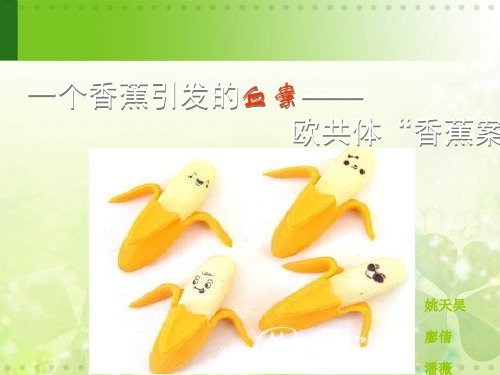
第一和第二香蕉案均未能使欧共体改正其 有关香蕉进口体制措施,美国及若干拉美 国家在WTO成立后,继续寻求问题的解决。
第三香蕉案(Bananas-III)
1996年5月8日,世贸组织成立DSB (Dispute Settlement Body)专家组。 专家组结论认为,《洛美协定》可以使欧 盟免除GATT中“非歧视数量限制”的义务, 但其香蕉进口许可证制度及分销体制在具 体运作过程中存在一些问题超出“洛美豁 免”的范围。第二年,欧盟表示愿意接受 相应裁决,修改其香蕉进口体制。
一个香蕉引发的血案—— 欧共体“香蕉案
姚天昊 廖倩 潘薇
背景介绍
欧共体(欧盟的前身)成立以来,一直是世界上最大的 香蕉消费市场,年均消费量多达几百万吨,价值近60亿美元。 而且香蕉问题一直是一项敏感议题,原因在于,一方面, 香蕉是不少亚非拉发展中国家通过出口换取外汇的主要产品; 另一方面,从哪些国家或地区进口香蕉,每年具体进口数额 的多少,又是欧共体各国贯彻其对外经济和外交政策的重要 杠杆。
1992年,拉美国家(包括哥斯的黎加、哥伦比亚、 尼加拉瓜、危地马拉和委内瑞拉等)首先利用 GATT争端解决程序对欧共体的香蕉进口体制提出 异议,宣称欧共体对于香蕉的进口制度违反了 GATT规则。
应这些国家要求,GATT理事会成立了专家 组来审理此案。专家组于1993年6月3日裁 决,欧共体的配额体系违反了GATT第1条 和第11条的规定。 但由于GATT争端解决机 制中要求全体缔约方(包括败诉方在内)“一
而欧盟则表示已竭尽权利,做到了既履行 《洛美协定》义务,又满足了WTO的要求, 是两方面折中的最好结果。
双方由此开始了进一步的纷争…………
1999年4月,在专家组的讨论报告结论中, 专家们也认为欧盟新体制并未完全克服旧 香蕉体制的缺陷,依然有超越世贸组织授 权范围,不恰当使用数量限制和过分偏袒 非、加、太国家之处,违背了最惠国待遇 和国民待遇义务。最后,专家组报告获得 通过,欧盟也表示不再上诉。
香蕉案
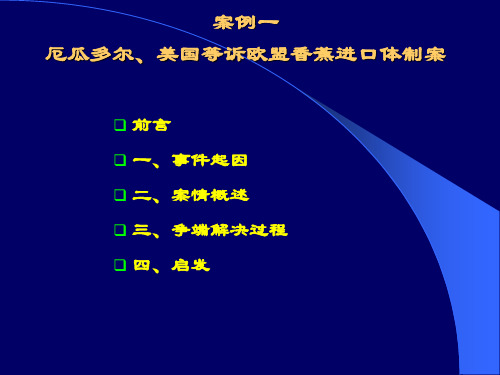
前言 一、事件起因 二、案情概述 三、争端解决过程 四、启发
前言
日美国、 自1995年10月4日美国、危地马拉、洪都拉斯、墨西哥 年 月 日美国 危地马拉、洪都拉斯、 向WTO争端解决机构( DSB)通知其要求与欧共体协 争端解决机构( ) 争端解决机构 商开始, 商开始,到 2001年4月30日DSB厄瓜多尔与欧共体达成 年 月 日 厄瓜多尔与欧共体达成 最终谅解, 香蕉案基本结束, 最终谅解 , 香蕉案基本结束 , 整个香蕉案具有如下特 点: 首先,文件众多,篇幅庞大。 首先,文件众多,篇幅庞大。 其次,涉及面广,卷入的WTO成员多,用尽了 成员多, 其次,涉及面广,卷入的 成员多 用尽了WTO争 争 端解决机制所能提供的所有程序。 端解决机制所能提供的所有程序。 最后,香蕉案是第一个WTO所受理的争端中挑战 所受理的争端中挑战WTO 最后,香蕉案是第一个 所受理的争端中挑战 争端解决机制的执行规则的案件。 争端解决机制的执行规则的案件。
其次, 涉及面广, 从货物贸易、 其次 , 涉及面广 , 从货物贸易 、 服务贸易到与贸易有 关的知识产权,几乎涉及 的所有重要贸易领域。 关的知识产权,几乎涉及WTO的所有重要贸易领域。 的所有重要贸易领域 卷入的WTO成员多,投诉方从 国增加到 国,被控方 成员多,投诉方从4国增加到 国增加到6国 卷入的 成员多 是由15个 国家组成的欧共体 是由 个 国家组成 的欧共体 , 以第三方身份干 预的 WTO成员则达 个之多。 成员则达20个之多 成员则达 个之多。 用尽了WTO争端解决机制所能提供的所有程序, 历经 争端解决机制所能提供的所有程序, 用尽了 争端解决机制所能提供的所有程序 6年。其复杂性异乎寻常,史无前例。 年 其复杂性异乎寻常,史无前例。
欧美香蕉案
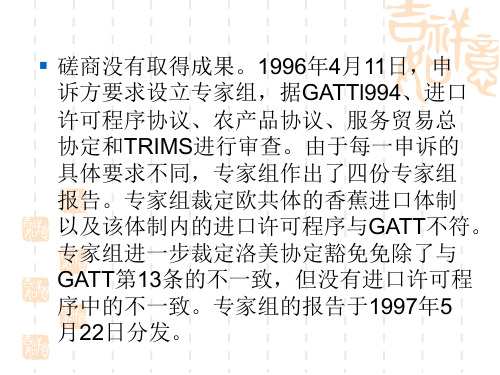
▪ 根据第22条第6款,美国提出的中止减让的 要求被争端解决机构推迟到中止减让水平
的仲裁裁决作出之后。在欧共体要求的专
家组程序中,专家组裁定,由于欧共体实
施建议的措施受到厄瓜多尔的实际指控,
专家组不同意欧共体的意见,视欧共体的
实施措施符合争端解决机构的建议。在厄
瓜多尔要求的专家组程序中,专家组裁定 欧共体的实施措施与欧共体的WTO义务不 完全一致。在欧共体要求的就美国提出的
▪ 但同时也应该看到,从争端解决机构通过至今, 已过去了三年的时间,这一问题还没有得到完全 的解决。是非曲直的裁定可能总是比是非曲直的 纠正容易得多。世界贸易组织争端解决制度与国 内司法制度的一个非常重要的不同是,没有国内 法律制度中的强制执行措施。争端解决机构的裁 决与建议要通过争端双方来解决,这是它力弱的 一个表现。但从另一角度说,这也可能是它的一 个优点。国家间的贸易关系,是国与国之间的关 系的一个方面,这中间也涉及到国家的主权问题, 涉及到国际法的效力问题。世界贸易组织是一个 管理、实施各成员达成贸易协议的一个机构,是 各成员解决争端的一个场所,是谈判和进一步谈 判的场所。它不是一个超国家的机构。这可能正 是其缔造者所希望的。
服务贸易总协定
▪ 第2条 最惠国待遇
▪ 1.在本协议项下的任何措施方面,各成员 应立即无条件给予任何其他成员的服务和 服务提供者以不低于给予其他任何国家相 同的服务和服务提供者的待遇。
▪ 2.一成员可以维持与第1款不一致的措施, 只要该措施列入第2条豁免附件并符合该附 件的条件。
▪ 3.本协议的规定不得解释为阻止任何成员 赋予其毗邻国家优惠,以便利在毗邻的边 境地区交换当地生产和消费的服务。
▪ 1999年1月12日争端解决机构同意召集原 来的专家组,据第21条第5款审查欧共体和 厄瓜多尔的申请。牙买加、尼加拉瓜、哥 伦比亚、哥斯达黎加、科特迪瓦、多米尼 加共和国、多米尼加、圣卢西亚、毛里求 斯、圣文森特,表示作为第三方参加两个 申请,而印度和厄瓜多尔表示只以第三方 参加欧共体的申请。1999年1月14日,美 国据DSU第22条第2款,要求争端解决机 构授权中止对欧共体的减让,数额为5亿2 千万美元。1月19日,欧共体据第22条第6 款,要求对美国提出的中止减让水平进行 仲裁。争端解决机构将该中止减让水平问 题交由原来的专家组仲裁。
解决矛盾纠纷的国际组织的事例
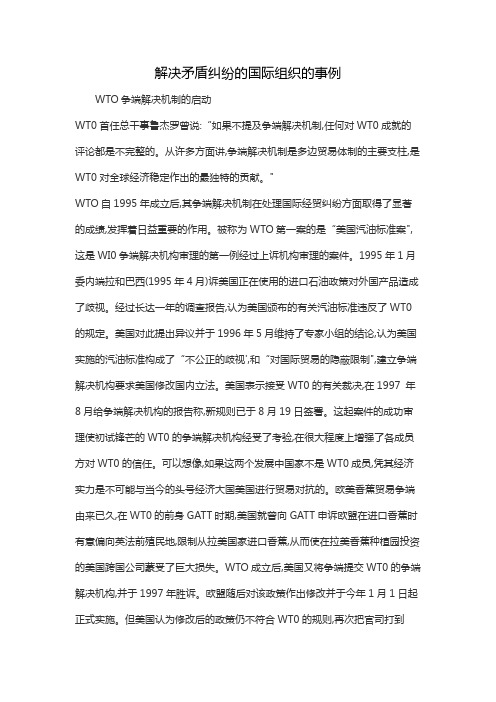
解决矛盾纠纷的国际组织的事例WTO争端解决机制的启动WT0首任总干事鲁杰罗曾说:“如果不提及争端解决机制,任何对WT0成就的评论都是不完整的。
从许多方面讲,争端解决机制是多边贸易体制的主要支柱,是WT0对全球经济稳定作出的最独特的贡献。
"WTO自1995年成立后,其争端解决机制在处理国际经贸纠纷方面取得了显著的成绩,发挥着日益重要的作用。
被称为WTO第一案的是“美国汽油标准案", 这是WI0争端解决机构审理的第一例经过上诉机构审理的案件。
1995年1月委内端拉和巴西(1995年4月)诉美国正在使用的进口石油政策对外国产品造成了歧视。
经过长达一年的调查报告,认为美国颁布的有关汽油标准违反了WT0的规定。
美国对此提出异议并于1996年5月维持了专家小组的结论,认为美国实施的汽油标准构成了“不公正的歧视',和“对国际贸易的隐蔽限制",建立争端解决机构要求美国修改国内立法。
美国表示接受WT0的有关裁决,在1997 年8月给争端解决机构的报告称,新规则已于8月19日签署。
这起案件的成功审理使初试锋芒的WT0的争端解决机构经受了考验,在很大程度上增强了各成员方对WT0的信任。
可以想像,如果这两个发展中国家不是WT0成员,凭其经济实力是不可能与当今的头号经济大国美国进行贸易对抗的。
欧美香蕉贸易争端由来已久,在WT0的前身GATT时期,美国就曾向GATT申诉欧盟在进口香蕉时有意偏向英法前殖民地,限制从拉美国家进口香蕉,从而使在拉美香蕉种植园投资的美国跨国公司蒙受了巨大损失。
WTO成立后,美国又将争端提交WT0的争端解决机构,并于1997年胜诉。
欧盟随后对该政策作出修改并于今年1月1日起正式实施。
但美国认为修改后的政策仍不符合WT0的规则,再次把官司打到WT0.3月,美国单方面宣布将对价值5.2亿美元的欧盟出口产品征收100%的惩罚性关税。
经W10裁决,欧盟香蕉进口政策被判不符合国际贸易规则,但欧盟偏向前英法殖民地的香蕉进口政策给美国香蕉出口代理商造成了1.914亿美元的损失,远低于美国宣称的损失。
今日说法中典型的宪法案例
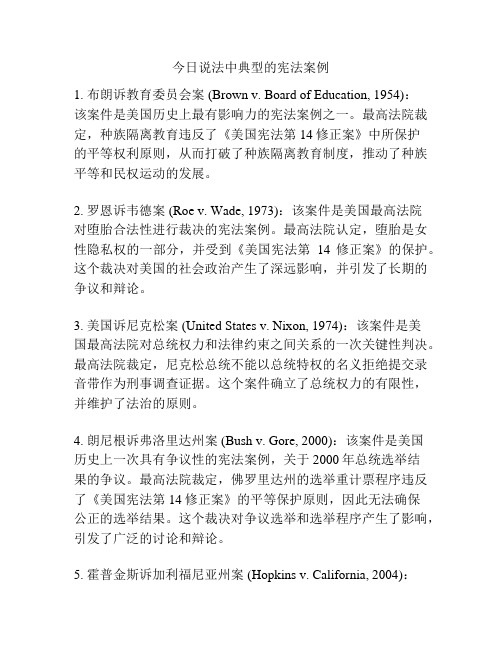
今日说法中典型的宪法案例1. 布朗诉教育委员会案 (Brown v. Board of Education, 1954):该案件是美国历史上最有影响力的宪法案例之一。
最高法院裁定,种族隔离教育违反了《美国宪法第14修正案》中所保护的平等权利原则,从而打破了种族隔离教育制度,推动了种族平等和民权运动的发展。
2. 罗恩诉韦德案 (Roe v. Wade, 1973):该案件是美国最高法院对堕胎合法性进行裁决的宪法案例。
最高法院认定,堕胎是女性隐私权的一部分,并受到《美国宪法第14修正案》的保护。
这个裁决对美国的社会政治产生了深远影响,并引发了长期的争议和辩论。
3. 美国诉尼克松案 (United States v. Nixon, 1974):该案件是美国最高法院对总统权力和法律约束之间关系的一次关键性判决。
最高法院裁定,尼克松总统不能以总统特权的名义拒绝提交录音带作为刑事调查证据。
这个案件确立了总统权力的有限性,并维护了法治的原则。
4. 朗尼根诉弗洛里达州案 (Bush v. Gore, 2000):该案件是美国历史上一次具有争议性的宪法案例,关于2000年总统选举结果的争议。
最高法院裁定,佛罗里达州的选举重计票程序违反了《美国宪法第14修正案》的平等保护原则,因此无法确保公正的选举结果。
这个裁决对争议选举和选举程序产生了影响,引发了广泛的讨论和辩论。
5. 霍普金斯诉加利福尼亚州案 (Hopkins v. California, 2004):该案件是关于美国刑事司法制度中种族歧视的一次重要宪法案例。
最高法院裁定,加利福尼亚州的陪审团摇盅法违反了《美国宪法第14修正案》中的平等保护原则。
这个裁决加强了对陪审团摇盅法的审查,并对刑事司法中的种族平等产生了影响。
香蕉争端案例
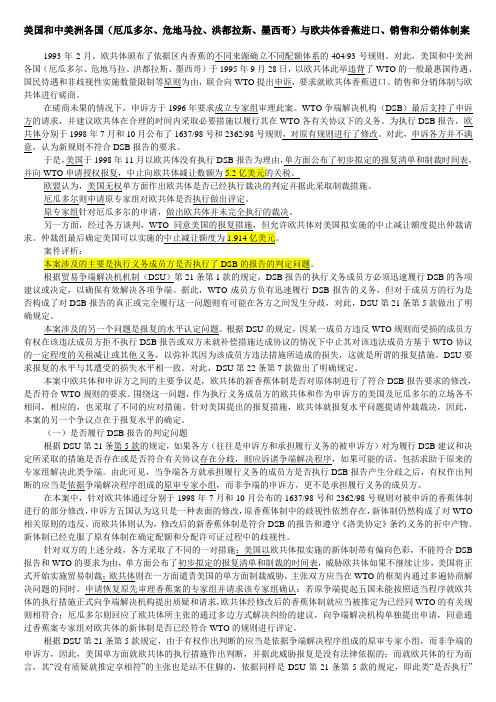
美国和中美洲各国(厄瓜多尔、危地马拉、洪都拉斯、墨西哥)与欧共体香蕉进口、销售和分销体制案1993年2月,欧共体颁布了依据区内香蕉的不同来源确立不同配额体系的404/93号规则。
对此,美国和中美洲各国(厄瓜多尔、危地马拉、洪都拉斯、墨西哥)于1995年9月28日,以欧共体此举违背了WTO的一般最惠国待遇、国民待遇和非歧视性实施数量限制等原则为由,联合向WTO提出申诉,要求就欧共体香蕉进口、销售和分销体制与欧共体进行磋商。
在磋商未果的情况下,申诉方于1996年要求成立专家组审理此案。
WTO争端解决机构(DSB)最后支持了申诉方的请求,并建议欧共体在合理的时间内采取必要措施以履行其在WTO各有关协议下的义务。
为执行DSB报告,欧共体分别于1998年7月和10月公布了1637/98号和2362/98号规则,对原有规则进行了修改。
对此,申诉各方并不满意,认为新规则不符合DSB报告的要求。
欧盟认为,美国无权单方面作出欧共体是否已经执行裁决的判定并据此采取制裁措施。
厄瓜多尔则申请原专家组对欧共体是否执行做出评定。
原专家组针对厄瓜多尔的申请,做出欧共体并未完全执行的裁决。
案件评析:根据贸易争端解决机机制(DSU)第21条第1款的规定,DSB报告的执行义务成员方必须迅速履行DSB的各项建议或决定,以确保有效解决各项争端。
据此,WTO成员方负有迅速履行DSB报告的义务,但对于成员方的行为是否构成了对DSB报告的真正或完全履行这一问题则有可能在各方之间发生分歧,对此,DSU第21条第5款做出了明确规定。
本案涉及的另一个问题是报复的水平认定问题。
根据DSU的规定,因某一成员方违反WTO规则而受损的成员方有权在该违法成员方拒不执行DSB报告或双方未就补偿措施达成协议的情况下中止其对该违法成员方基于WTO协议的一定程度的关税减让或其他义务,以弥补其因为该成员方违法措施所造成的损失,这就是所谓的报复措施。
DSU要求报复的水平与其遭受的损失水平相一致。
各国各地法律案例(3篇)

第1篇一、美国:无罪辩护的胜利——辛普森案1994年,美国著名橄榄球运动员奥逊·辛普森的前妻妮可·布朗和她的好友罗纳德·戈德曼在洛杉矶被杀害。
警方很快将辛普森列为嫌疑人,并找到了与现场相匹配的血迹。
然而,在1995年的审判中,辛普森被判无罪。
这起案件成为了美国司法史上的一个标志性事件。
在审判过程中,辛普森的律师团队运用了多种辩护策略,包括质疑证据的可靠性、攻击检方证人以及强调辛普森的无罪。
最终,陪审团在考虑了所有证据后,认定辛普森无罪。
二、英国:隐私权与新闻报道的冲突——默多克案2011年,英国《世界新闻报》的窃听丑闻爆发,该报曾非法窃听包括遇害儿童在内的受害者家属的电话。
2013年,英国新闻集团老板鲁珀特·默多克及其子詹姆斯·默多克因涉嫌妨碍司法公正被传讯。
在这起案件中,英国法律界面临了隐私权与新闻报道自由的冲突。
一方面,公众有权了解重要新闻;另一方面,个人隐私权应得到保护。
最终,法院在权衡两者之间的关系后,判决默多克及其子妨碍司法公正罪名成立。
三、德国:纳粹罪行赔偿案二战期间,德国纳粹政权犯下了无数罪行,给世界带来了深重灾难。
战后,德国政府承诺赔偿二战期间受害者及其家属。
然而,赔偿问题一直存在争议。
近年来,德国法院审理了多起纳粹罪行赔偿案。
其中,最引人注目的是2016年德国法院判决德国国家铁路公司(DB)向二战期间被强制劳动的中国劳工支付赔偿金。
这起案件反映了德国在处理历史问题上的责任与担当。
四、中国:食品安全监管案例——毒奶粉事件2008年,中国发生了一场严重的食品安全事故——三聚氰胺奶粉事件。
数百名婴儿因食用含三聚氰胺的奶粉而患上肾结石。
这起事件引发了公众对食品安全监管的强烈质疑。
在事件发生后,中国政府迅速采取措施,加强食品安全监管。
2010年,法院审理了这起案件,判决相关责任人犯有生产、销售有毒、有害食品罪,并处以重刑。
这起案件警示了全社会,食品安全问题不容忽视。
美国与欧盟香蕉贸易战下的特惠待遇体制
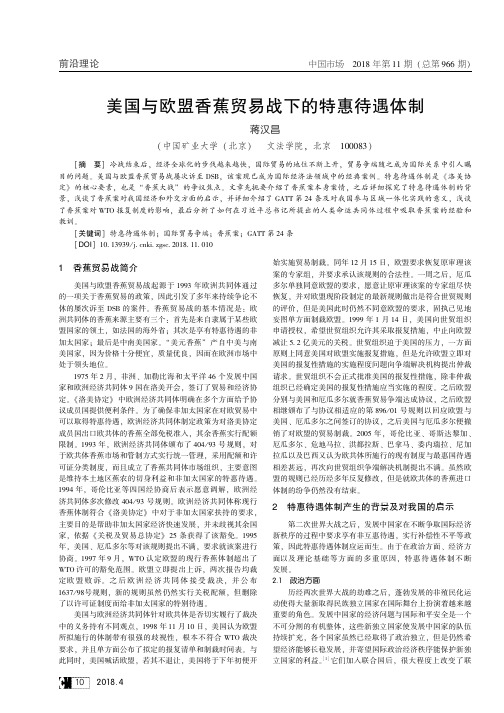
美国与欧盟香蕉贸易战下的特惠待遇体制蒋汉昌(中国矿业大学(北京)文法学院,北京100083)[摘要]冷战结束后,经济全球化的步伐越来越快,国际贸易的地位不断上升,贸易争端随之成为国际关系中引人瞩目的问题。
美国与欧盟香蕉贸易战屡次诉至DSB,该案现已成为国际经济法领域中的经典案例。
特惠待遇体制是《洛美协定》的核心要素,也是“香蕉大战”的争议焦点。
文章先扼要介绍了香蕉案本身案情,之后详细探究了特惠待遇体制的背景,浅谈了香蕉案对我国经济和外交方面的启示,并详细介绍了GATT第24条及对我国参与区域一体化实践的意义,浅谈了香蕉案对WTO报复制度的影响,最后分析了如何在习近平总书记所提出的人类命运共同体过程中吸取香蕉案的经验和教训。
[关键词]特惠待遇体制;国际贸易争端;香蕉案;GATT第24条[DOI]10.13939/ki.zgsc.2018.11.0101香蕉贸易战简介美国与欧盟香蕉贸易战起源于1993年欧洲共同体通过的一项关于香蕉贸易的政策,因此引发了多年来持续争论不休的屡次诉至DSB的案件。
香蕉贸易战的基本情况是:欧洲共同体的香蕉来源主要有三个:首先是来自隶属于某些欧盟国家的领土,如法国的海外省;其次是享有特惠待遇的非加太国家;最后是中南美国家。
“美元香蕉”产自中美与南美国家,因为价格十分便宜,质量优良,因而在欧洲市场中处于领头地位。
1975年2月,非洲、加勒比海和太平洋46个发展中国家和欧洲经济共同体9国在洛美开会,签订了贸易和经济协定。
《洛美协定》中欧洲经济共同体明确在多个方面给予协议成员国提供便利条件。
为了确保非加太国家在对欧贸易中可以取得特惠待遇,欧洲经济共同体制定政策为对洛美协定成员国出口欧共体的香蕉全部免税准入,其余香蕉实行配额限制。
1993年,欧洲经济共同体颁布了404/93号规则,对于欧共体香蕉市场和管制方式实行统一管理,采用配额和许可证分类制度,而且成立了香蕉共同体市场组织,主要意图是维持本土地区蕉农的切身利益和非加太国家的特惠待遇。
欧盟香蕉案
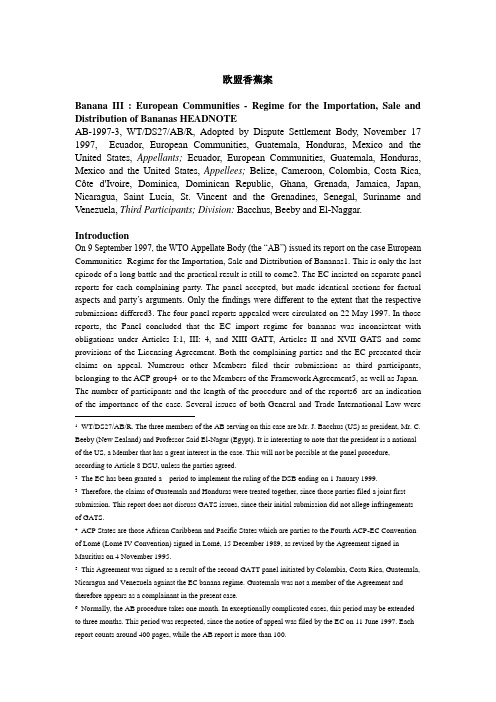
欧盟香蕉案Banana III : European Communities - Regime for the Importation, Sale and Distribution of Bananas HEADNOTEAB-1997-3, WT/DS27/AB/R, Adopted by Dispute Settlement Body, November 17 1997, Ecuador, European Communities, Guatemala, Honduras, Mexico and the United States, Appellants; Ecuador, European Communities, Guatemala, Honduras, Mexico and the United States, Appellees; Belize, Cameroon, Colombia, Costa Rica, Côte d'Ivoire, Dominica, Dominican Republic, Ghana, Grenada, Jamaica, Japan, Nicaragua, Saint Lucia, St. Vincent and the Grenadines, Senegal, Suriname and V enezuela, Third Participants; Division: Bacchus, Beeby and El-Naggar. IntroductionOn 9 September 1997, the WTO Appellate Body (the “AB”) issued its report on the case European Communities- Regime for the Importation, Sale and Distribution of Bananas1. This is only the last episode of a long battle and the practical result is still to come2. The EC insisted on separate panel reports for each complaining party. The panel accepted, but made identical sections for factual aspects and party’s arguments. Only the findings were different to the extent that the respective submissions differed3. The four panel reports appealed were circulated on 22 May 1997. In those reports, the Panel concluded that the EC import regime for bananas was inconsistent with obligations under Articles I:1, III: 4, and XIII GATT, Articles II and XVII GATS and some provisions of the Licensing Agreement. Both the complaining parties and the EC presented their claims on appeal. Numerous other Members filed their submissions as third participants, belonging to the ACP group4 or to the Members of the Framework Agreement5, as well as Japan. The number of participants and the length of the procedure and of the reports6 are an indication of the importance of the case. Several issues of both General and Trade International Law were1WT/DS27/AB/R. The three members of the AB serving on this case are Mr. J. Bacchus (US) as president, Mr. C. Beeby (New Zealand) and Professor Said El-Nagar (Egypt). It is interesting to note that the president is a national of the US, a Member that has a great interest in the case. This will not be possible at the panel procedure, according to Article 8 DSU, unless the parties agreed.2The EC has been granted a period to implement the ruling of the DSB ending on 1 January 1999.3Therefore, the claims of Guatemala and Honduras were treated together, since those parties filed a joint first submission. This report does not discuss GATS issues, since their initial submission did not allege infringementsof GATS.4ACP States are those African Caribbean and Pacific States which are parties to the Fourth ACP-EC Convention of Lomé (Lomé IV Convention) signed in Lomé, 15 December 1989, as revised by the Agreement signed in Mauritius on 4 November 1995.5This Agreement was signed as a result of the second GATT panel initiated by Colombia, Costa Rica, Guatemala, Nicaragua and Venezuela against the EC banana regime. Guatemala was not a member of the Agreement and therefore appears as a complainant in the present case.6Normally, the AB procedure takes one month. In exceptionally complicated cases, this period may be extended to three months. This period was respected, since the notice of appeal was filed by the EC on 11 June 1997. Each report counts around 400 pages, while the AB report is more than 100.examined and given innovative solutions. The AB is building on the WTO provisions to play its institutional role. The rulings of this initial period furnish the fundamental orientation and principles for the future functioning of the dispute settlement of the Organisation. The analysis is therefore separated in two parts, one relating to the issues of importance for International Law and the second one dealing with International Trade rules.ConclusionsAs a result of the AB it has been confirmed that main aspects of the EC import regime for bananas is inconsistent with WTO rules. The EC will be faced with the obligation of implementing the AB Report, while complying with its commitments under the LoméConvention, namely, giving traditional imports of ACP bananas treatment not less favourable than in the past. This ruling will also encourage the EC to negotiate the next Lomé Convention in a manner which will conform with WTO obligations, according to the different possibilities foreseen by the European Commission in its Green Paper7.The EC regime as it stands today is inconsistent with non-discrimination obligations both under GA TT and under GATS, since it favours imports coming from some regions (EC, DOM and ACP countries and those parties to the Framework Agreement on Bananas) to the expense of other exporting countries. The Commission has proposed the following modifications: To maintain the present tariff quota for non-traditional ACP and third country bananas at 2.2 million tonnes at a duty of 75 ECU/tonne (in stead of 100 ECU/tonne). Additionally, a supplementary quota of 353.000 tonnes at a duty of 300 ECU/tonne would be established to take account of the enlargement.The current licensing system would be dismantled by abolishing Category B licenses and export certificates for FAB countries. This will alter the market conditions. The existing licences are designed to allow cross-subsidies between }mporters of dollar bananas and those of traditional ACP and EC bananas, which are less efficient. To compensate the foreseeable income loss for ACP bananas, the Commission proposes a system of technical and financial assistance, defined for each ACP country8. Another effect is to abolish the FAB modifications to the EC Regime. As before those modifications, all Latin American bananas will be treated in the same way, with the difference that they will not be disadvantaged with respect to ACP bananas. Some of the features of the current system, which do not conflict with WTO obligations, such as the existence of tariff quotas, will be maintained.The overall impact of the reform should benefit the European consumers. Dollar bananas will be available at a lower price and this will influence their choices. ACP bananas will still be accessible, since the quota for traditional imports will probably be maintained, at least until the next Loménegotiation. EC bananas will also maintain their quota.Concerning the operators in the European market, those who are benefiting of Category B licenses are going to loose their quota rent. Since most of them are European based companies, the European operators are the most harmed by this AB ruling. On the contrary, those operators traditionally importing dollar bananas, mainly big transnational companies, will benefit from an7Green Paper on relations between the European Union and the ACP countries on the eve of the 21st century, European Commission, 1997. (http://europa.eu.int)8The use of a system of production subsidies had already been pointed out by the doctrine to minimise the distortionary impact of the internal banana market. See READ R. “The EC Banana Market: The Issues and the Dilemma”, The World Economy, 2(1994), 219-235, at 234.additional income due to the lower import tariff.It remains to be seen whether the producers in the developing countries of the tropical areas will really gain from the reform to be undertaken or if the profit will stay in the trading companies.It is widely acknowledged that the current WTO dispute settlement has moved towards a more rule-oriented system9. The Report in this case contains several innovative conclusions which have a meaning in the definition of the institutional role of the AB. The possibility for private lawyers to represent a Member’s delegation in the AB hearing represents some openness of a purely intergovernmental system. Private lawyers may give a more legally oriented reasoning than government officials. Furthermore, the way in which the AB modifies the reasoning of the Panel in certain points such as the interpretation of the Japan-Alcoholic Beverages case10 reveals a concern for clarity of the legal reasoning, towards a more predictable system. The call for a system of preliminary rulings goes certainly in the same direction. Their impact would depend much on whether they would be admitted as authoritative interpretation or not11.The AB is building up its own identity. As a young institution, it has to provide in its early rulings with principles and guidance that will probably be followed in the future. As in other Reports12, the AB is contributing to the consolidation of the rule of law in the field of international trade.9See YOUNG, M. “Dispute resolution in the Uruguay Round: Lawyers triumph over diplomats”, The International Lawyer, 2(1995) 29 389-409 and MONTAÑÀ I MORA, “A GATT with teeth: Law wins over politics in the resolution of international trade disputes”, 31 Columbia Journal of Transnational Law, 103 (1993), 128-136.10See supra note 错误!未定义书签。
欧共体香蕉案
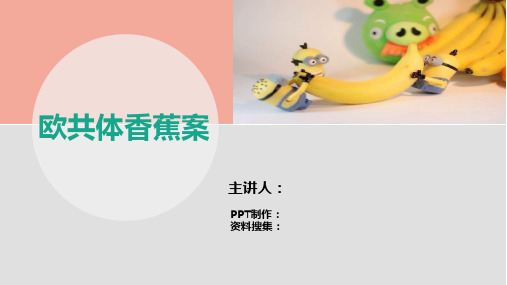
和请求,则欧盟经修改后的香蕉进口新体制应被推定为己同世界贸易组织的有关
规则相符合。
二
·五国之中的厄瓜多尔于1998年12月18日单独同意由原香蕉案专家组对欧盟 的新体制是否已经符合世贸规则进行评定。 ·而美国却坚持其原有立场,坚持准备单方面制裁欧盟。1999年1月14日,美国 申请世贸组织授权其采取报复措施,中止向欧盟减让数额为5.2亿美元的关税。 1999年1月25日至30日欧美贸易代表在世贸组织日内瓦总部举行谈判。经过艰苦 谈判达成协议:即世贸组织原则上同意美国实行制裁,但允许欧盟立即对美国制裁 措施的实施程度问题向争端解决机构提出仲裁请求,而在仲裁组未决定美国的制裁 措施究竟应该维持在何等水平之前,世贸组织将不正式批准美国的制裁措施。
欧共体香蕉进口体制
为了拆除香蕉贸易障碍,1993 年 2 月,欧共体颁布了 404/93 号规则,根据欧共体区域内香蕉的不同 来源确立不同配额体系。随后,欧共体又通过立法、制定条例、颁布行政措施等途径,建立一个涵盖香 蕉进口、销售、分销等各领域的法律法规体制(简称“欧共体香蕉进口体制”)。 欧盟继续依据第四个《洛美协定》中关于香蕉贸易的特殊安排给予非加太国家以特惠待遇: ①欧盟为传统的非加太香蕉出口国确立了保护性国别配额,配额之内非加太各国可免关税向欧盟出口, 并且,欧盟通过对进口许可证按照香蕉的原产地进行分类和分配,从而为非加太香蕉预留了30%的市场 份额; ②欧盟则严格限制非加太香蕉的主要竞争对手“美元香蕉”,一是对“美元香蕉”确定含关税配额,配 额之内每吨加征75欧洲货币单位的关税;二是在“美元香蕉”的进口许可证审核及发放过程中规定了较 非加太香蕉实际更为严苛的条件和复杂的程序。
欧共体香蕉案
主讲人:
PPT制作: 资料搜集:
香蕉案解析
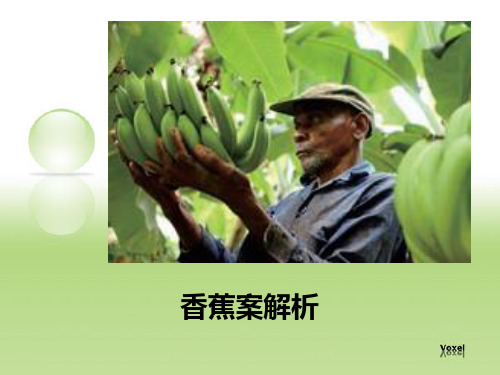
销售其他第三国进口的香蕉,获配额66.5%; 欧非香蕉 销售欧盟及非加太国家的香蕉,获配额30%; 留给新加入共同市场组织的经营者 从1992年开始销售欧盟及非加太国家的香蕉,获配额3.5%。
DS16 European Communities — Regime for the Importation, Sale and Distribution of Bananas (Complainants: Guatemala; Honduras; Mexico; United States) European Communities — Regime for the Importation, Sale and Distribution of Bananas (Complainants: Ecuador; Guatemala; Honduras; Mexico; United States) European Communities — Regime for the Importation, Sale and Distribution of Bananas (Complainant: Panama) United States — Sections 301–310 of the Trade Act 1974 (Complainant: European Communities) European Communities — Regime for the Importation, Sale and Distribution of Bananas (Complainants: Guatemala; Honduras; Mexico; Panama; United States) United States — Import Measures on Certain Products from the European Communities (Complainant: European Communities) Turkey — Certain Import Procedures for Fresh Fruit (Complainant: Ecuador) European Communities — Regime for the Importation of Bananas (Complainant: Colombia) 28 September 1995
案例研究:香蕉案
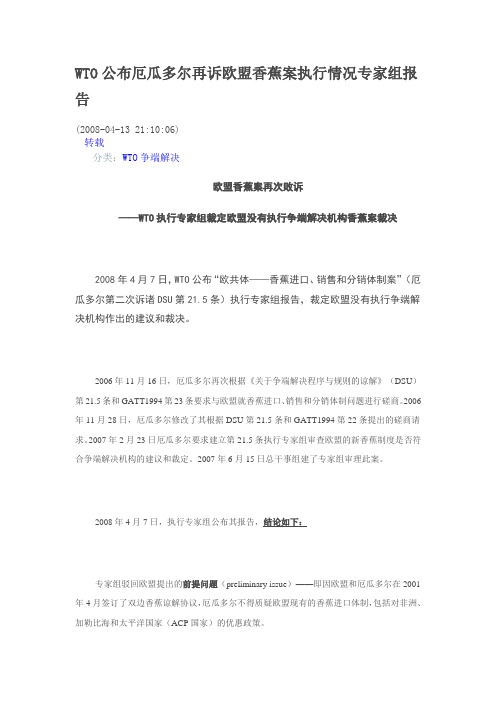
WTO公布厄瓜多尔再诉欧盟香蕉案执行情况专家组报告(2008-04-13 21:10:06)转载分类:WTO争端解决欧盟香蕉案再次败诉——WTO执行专家组裁定欧盟没有执行争端解决机构香蕉案裁决2008年4月7日,WTO公布“欧共体——香蕉进口、销售和分销体制案”(厄瓜多尔第二次诉诸DSU第21.5条)执行专家组报告,裁定欧盟没有执行争端解决机构作出的建议和裁决。
2006年11月16日,厄瓜多尔再次根据《关于争端解决程序与规则的谅解》(DSU)第21.5条和GATT1994第23条要求与欧盟就香蕉进口、销售和分销体制问题进行磋商。
2006年11月28日,厄瓜多尔修改了其根据DSU第21.5条和GATT1994第22条提出的磋商请求。
2007年2月23日厄瓜多尔要求建立第21.5条执行专家组审查欧盟的新香蕉制度是否符合争端解决机构的建议和裁定。
2007年6月15日总干事组建了专家组审理此案。
2008年4月7日,执行专家组公布其报告,结论如下:专家组驳回欧盟提出的前提问题(preliminary issue)——即因欧盟和厄瓜多尔在2001年4月签订了双边香蕉谅解协议,厄瓜多尔不得质疑欧盟现有的香蕉进口体制,包括对非洲、加勒比海和太平洋国家(ACP国家)的优惠政策。
据此在审查厄瓜多尔提出的实质性主张及欧盟援用的辩护意见后,专家组得出以下结论:1.欧盟对原产自ACP国家的香蕉每年授予775,000公吨的零关税配额构成了对此类香蕉的优惠待遇,而这一待遇没有惠及原产地为非ACP国家的WTO成员生产的同类香蕉,因此与GATT1994第1.1条不符;2.“多哈豁免”于2006年1月1日到期,因此没有证据表明自专家组建立之日至此报告之日期间有任何GATT1994第1.1条下的豁免适用于欧盟对原产自ACP国家零关税配额的优惠政策;3.欧盟目前的香蕉进口体制,尤其是为ACP国家保留的优惠关税配额与GATT1994第13.1条、第13.2条引言及第13.2(d)条不符;4.欧盟对最惠国进口香蕉的适用关税设为每公吨176欧元,不考虑考虑在220万公吨配额内的每公吨75欧元的约束关税,这一普通关税超过了欧盟减让表第一部分中设定和规定的税率,因此与GATT1994第2.1(b)条不符。
市场营销专业《案例;拉美国家与欧盟展开香蕉贸易战》
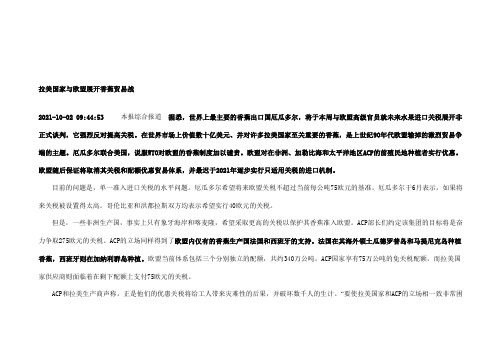
拉美国家与欧盟展开香蕉贸易战2021-10-02 09:44:53 本报综合报道据悉,世界上最主要的香蕉出口国厄瓜多尔,将于本周与欧盟高级官员就未来水果进口关税展开非正式谈判,它强烈反对提高关税。
在世界市场上价值数十亿美元、并对许多拉美国家至关重要的香蕉,是上世纪90年代欧盟输掉的激烈贸易争端的主题。
厄瓜多尔联合美国,说服WTO对欧盟的香蕉制度加以谴责。
欧盟对在非洲、加勒比海和太平洋地区ACP的前殖民地种植者实行优惠。
欧盟随后保证将取消其关税和配额优惠贸易体系,并最迟于2021年逐步实行只适用关税的进口机制。
目前的问题是,单一准入进口关税的水平问题。
厄瓜多尔希望将来欧盟关税不超过当前每公吨75欧元的基准。
厄瓜多尔于6月表示,如果将来关税被设置得太高。
哥伦比亚和洪都拉斯双方均表示希望实行40欧元的关税。
但是,一些非洲生产国,事实上只有象牙海岸和喀麦隆,希望采取更高的关税以保护其香蕉准入欧盟。
ACP部长们约定该集团的目标将是奋力争取275欧元的关税。
ACP的立场同样得到了欧盟内仅有的香蕉生产国法国和西班牙的支持。
法国在其海外领土瓜德罗普岛和马提尼克岛种植香蕉,西班牙则在加纳利群岛种植。
欧盟当前体系包括三个分别独立的配额,共约340万公吨。
ACP国家享有75万公吨的免关税配额,而拉美国家供应商则面临着在剩下配额上支付75欧元的关税。
ACP和拉美生产商声称,正是他们的优惠关税将给工人带来灾难性的后果,并破坏数千人的生计。
“要使拉美国家和ACP的立场相一致非常困难。
双方有着完全不同的观点,你很可能使每个人都感到不满意,”加勒比香蕉出口国联盟执行秘书戈登梅尔斯说,“我们需要实行一种足够高的关税以维持当前产量和价格,关键是维持种植者的生计”。
拉美6个香蕉生产国就欧盟提高关税向世贸组织提出调查申请日期:2005-04-04 比亚《共和国报》消息,3月30日,厄瓜多尔、哥伦比亚、哥斯达黎加、巴拿马、洪都拉斯和危地马拉6国向世贸组织提出申请,要求就欧盟拟将拉美地区香蕉进口关税从目前的75欧元提高到230欧元的措施建议将对拉美地区香蕉产区造成的损害进行调查。
从欧盟香蕉案看世贸组织中报告的执行问题

-* 提 供 补 偿 # 若 违 背 义 务 的 一 方 在 合 理 的 履 行 期 限 内
不履行建议 ! 引用争端解决程序的一方可以要求补偿 " 或者 ! 违背义务的一方可以主动提出给予补偿 " +*授权 报复 # 如果该合理的时间期限届满后的 -, 天内 ! 各当 事方没有达成赔偿协议 ! 或者败诉方未能履行建议并 拒绝提供补偿时 . 已经援引争端解决程序的当事方可 以请求争端解决机构授权中止适用该有关成员方对各 有关协议的减让或其他义务 " 因此 ! 根据 !"# 的规定 ! 专家组或上诉机构的报告可以通过三种形式获得履 行 #$* 撤销或者修改被宣告为不符合世贸规则的国内 措施 ’-* 提供补偿 ’+* 如果败诉方 不撤销或者修改 其 国 内措施也不提供补偿 !则由世贸组织授权胜诉方报复 " 但是一个有效的裁决如何最终得到实际履行 ! 在世贸 协定中并没有明确的规定 ! 而专门适用于争端解决程 序的谅解中所设定的几种履行报告的方式在实践中也 体现了它的局限性 " 尤其是 !关于履行报告的合理时间 期限 ! 这个是在实践中最被滥用的环节 ! 败诉方总是可 以利用 % 合理的时间 & 来最大限度地延长其与世贸规则 不符的措施适用的时间 " 而 % 执行监督 &程序被认为是
# 如 1996 年的美国精炼汽油和普通汽油案中 ! 专家组和上诉机构认定了美国的( 空 气清洁法 ) 违反了世贸组织中关于国民待遇原则的规则 !
在报告获得通过后 ! 美国表示接受报告 ! 并对本国的法律做出相应的调整 ’ 又如在美国和欧盟等 国家间的钢铁保障措施案中 ! 美国也接受了报 告并且停止了已经采取的保障措施 "
!! [
欧盟与拉美的香蕉大战
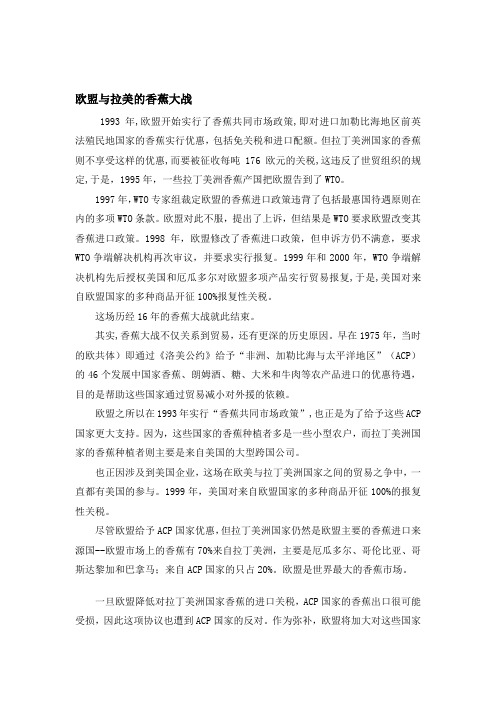
欧盟与拉美的香蕉大战1993年,欧盟开始实行了香蕉共同市场政策,即对进口加勒比海地区前英法殖民地国家的香蕉实行优惠,包括免关税和进口配额。
但拉丁美洲国家的香蕉则不享受这样的优惠,而要被征收每吨176欧元的关税,这违反了世贸组织的规定,于是,1995年,一些拉丁美洲香蕉产国把欧盟告到了WTO。
1997年,WTO专家组裁定欧盟的香蕉进口政策违背了包括最惠国待遇原则在内的多项WTO条款。
欧盟对此不服,提出了上诉,但结果是WTO要求欧盟改变其香蕉进口政策。
1998年,欧盟修改了香蕉进口政策,但申诉方仍不满意,要求WTO争端解决机构再次审议,并要求实行报复。
1999年和2000年,WTO争端解决机构先后授权美国和厄瓜多尔对欧盟多项产品实行贸易报复,于是,美国对来自欧盟国家的多种商品开征100%报复性关税。
这场历经16年的香蕉大战就此结束。
其实,香蕉大战不仅关系到贸易,还有更深的历史原因。
早在1975年,当时的欧共体)即通过《洛美公约》给予“非洲、加勒比海与太平洋地区”(ACP)的46个发展中国家香蕉、朗姆酒、糖、大米和牛肉等农产品进口的优惠待遇,目的是帮助这些国家通过贸易减小对外援的依赖。
欧盟之所以在1993年实行“香蕉共同市场政策”,也正是为了给予这些ACP 国家更大支持。
因为,这些国家的香蕉种植者多是一些小型农户,而拉丁美洲国家的香蕉种植者则主要是来自美国的大型跨国公司。
也正因涉及到美国企业,这场在欧美与拉丁美洲国家之间的贸易之争中,一直都有美国的参与。
1999年,美国对来自欧盟国家的多种商品开征100%的报复性关税。
尽管欧盟给予ACP国家优惠,但拉丁美洲国家仍然是欧盟主要的香蕉进口来源国--欧盟市场上的香蕉有70%来自拉丁美洲,主要是厄瓜多尔、哥伦比亚、哥斯达黎加和巴拿马;来自ACP国家的只占20%。
欧盟是世界最大的香蕉市场。
一旦欧盟降低对拉丁美洲国家香蕉的进口关税,ACP国家的香蕉出口很可能受损,因此这项协议也遭到ACP国家的反对。
- 1、下载文档前请自行甄别文档内容的完整性,平台不提供额外的编辑、内容补充、找答案等附加服务。
- 2、"仅部分预览"的文档,不可在线预览部分如存在完整性等问题,可反馈申请退款(可完整预览的文档不适用该条件!)。
- 3、如文档侵犯您的权益,请联系客服反馈,我们会尽快为您处理(人工客服工作时间:9:00-18:30)。
WORLD TRADEORGANIZATIONWT/DS361/1G/L/81826 March 2007(07-1254)Original: EnglishEUROPEAN COMMUNITIES – REGIME FOR THE IMPORTATION OF BANANASRequest for Consultations by ColombiaThe following communication, dated 21 March 2007, from the delegation of Colombia to the delegation of the European Communities and to the Chairman of the Dispute Settlement Body, is circulated in accordance with Article 4.4 of the DSU._______________My authorities have instructed me to request the European Communities ("EC") to consult with Colombia pursuant to Article 4 of the Understanding on Rules and Procedures Governing the Settlement of Disputes ("DSU"), Article XXIII:1 of the General Agreement on Tariffs and Trade 1994 ("GATT 1994"), and Paragraph 3 of the Understanding in Respect of Waivers of Obligations under the General Agreement on Tariffs and Trade 1994 on the regime for the importation of bananas that the EC has applied since 1 January 2006.Background to the consultations requested by ColombiaIn the dispute EC – Bananas III, certain aspects of the EC's previous banana import regime were found to be inconsistent with WTO law.1The EC reached Understandings with Ecuador 2and the United States3identifying means for the resolution of that dispute. According to these Understandings, the EC was to "introduce a Tariff Only regime for imports of bananas no later than 1 January 2006",4to rebind its import tariff on bananas, and to initiate "GATT Article XXVIII negotiations ... in good time t o that effect …"5Both Understandings provided for the application of three tariff-rate quotas until 31 December 2005, including a zero duty tariff-rate quota for bananas originating in ACP States("ACP bananas") up to an annual quantity of 750,000 tonnes.6To enable the EC to accord this tariff-rate quota, the EC was granted a waiver from Articles XIII:1 and XIII:2 of the GATT 1994 until 31 December 2005 (the "Article XIII Doha Waiver") .7Furthermore, to enable the EC to provide preferential tariff treatment to products of ACP origin, as required by Article 36.3, Annex V and its Protocols of the ACP-EC Partnership Agreement, the EC was granted a waiver from Article I of the GATT 1994 until 31 December 2007 (the "Article I Doha Waiver") .8In respect of bananas, the application of the Article I Doha Waiver beyond 31 December 2005 was made subject to a number of terms and conditions. The waiver specified that the EC shall rebind its import tariff on bananas at a level that "would result in at least maintaining total market access for MFN banana suppliers".9It further provided for "multilateral control on the implementation of this commitment"10through a two-stage arbitration procedure and specified that both the "Article XXVIII negotiations and the arbitration procedures shall be concluded before the entry into force of the new EC tariff only regime on 1 January 2006."11In a communication dated 31 January 2005, the EC stated that it envisaged rebinding its import tariff for bana nas at the level of 230€/tonne.12Following the receipt of this communication, Colombia and other MFN banana suppliers (the "Interested Parties") initiated the arbitration procedure contemplated in the Article I Doha Waiver. The Arbitrator determined that the EC's "envisaged rebinding [of 230€/tonne] would not result in at least maintaining total market access for MFN banana suppliers, taking into account all EC WTO market-access commitments relating to bananas".13The Article I Doha Waiver required the EC to "rectify the matter" if the Arbitrator were to find that the rebinding initially proposed would not result in at least maintaining total market access for MFN banana suppliers.14On 13 September 2005, the EC notified the Interested Parties that it intended to rectify the matter by setting its import tariff for bananas at the level of 187€/tonne an d establishing a zero duty tariff-rate quota of 775,000 tonnes per year for ACP bananas. Subsequently, the EC initiated the second stage of the arbitration procedure to determine whether its proposal would at least maintain total market access for MFN banana suppliers. Once again, the Arbitrator determined that the EC proposal failed that standard and that, consequently, the EC had "failed to rectify the matter, in accordance with the fifth tiret of the Annex to the Doha Waiver."15On 1 January 2006, the EC implemented a new regime for the importation of bananas under which the tariff levied on bananas of MFN origin ("MFN bananas") was set at 176€/tonne, and ACP bananas may be imported at zero duty up to an annual quantity of 775,000 tonnes (the "ACP TRQ") .Measure at issue and legal basis of Colombia's complaintThe measure at issue is the EC's the new import regime for bananas set out in (i) Council Regulation (EC) No 1964/2005 of 29 November 2005 on the tariff rates for bananas and (ii) Commission Regulation (EC) No 2014/2005 of 9 December 2005, as amended by Commission Regulation (EC) No 566/2006 of 6 April 2006, on licences under thearrangements for importing bananas into the Community in respect of bananas released into free circulation at the common customs tariff rate of duty, and (iii) all other legal instruments implementing, relating to, or amending any of the foregoing.Colombia considers that the new import regime for bananas is inconsistent with the GATT 1994 for the following reasons:1. The application of a t ariff of 176€/tonne to imports of MFN bananas is inconsistentwith Article II:1 of the GATT 1994 because it is in excess of the duties set forthunder heading 0803001916of the EC's Schedule of Concessions. That scheduleprovides for an in-quota duty of 75€/tonne within a tariff-rate quota of 2.2 milliontonnes. The levying of import tariffs in excess of 75€/tonne for all imports ofMFN bananas is inconsistent with this concession. For this reason, beforeapplying to MFN bananas a tariff higher than 75€/tonne, the EC should haverenegotiated its tariff concession on bananas in accordance with the procedures setout in Article XXVIII of the GATT 1994, as agreed to in its Understandings withEcuador and the United States, and as contemplated under the Article I DohaWaiver.2. Only ACP bananas benefit from the application of a zero tariff. The denial of thisadvantage to MFN bananas is inconsistent with Article I:1 of the GATT 1994.This inconsistency cannot be justified under the Article I Doha Waiver becausethat waiver ceased to apply to bananas as of 1 January 2006, given the Arbitrator'sdetermination that the EC had failed to rectify the matter. In any case, the ECcannot invoke this waiver to justify the inconsistency with Article I:1 of theGATT 1994 because it does not observe the terms and conditions of the waiver. Inparticular, it has failed to rebind its import tariff on bananas and at a level thatresults in at least maintaining total market access for MFN banana suppliers,taking into account all EC WTO market-access commitments.3. The application of the ACP TRQ entails discrimination between ACP bananas andMFN bananas inconsistent with Articles XIII:1, XIII:2, and XIII:5 of the GATT1994. This inconsistency cannot be justified under the Article XIII Doha Waiverbecause that waiver expired on 31 December 2005 and has not been extended.17Procedural AspectsThe Understanding between the EC and Ecuador, the EC and the United States, and the Article I Doha Waiver envisaged a final resolution of a long-standing dispute by 1 January 2006. Regrettably, the EC has once again taken measures inconsistent with WTO law that seriously harm an important sector of Colombia's economy. As a developing country heavily dependent on its exports of bananas, Colombia can ill-afford yet another lengthy dispute settlement proceeding conducted according to standard time frames. Accordingly, Colombia requests the EC to hold consultations within the time frame set out in Article 4.8 of the DSUfor cases of urgency, that is within 10 days after the date of receipt of this request. Should these consultations not lead to a satisfactory settlement, Colombia will consider referring the matter to the Director General pursuant to Article 3.12 of the DSU and the Decision of 5 April 1966 (BISD 14S/18) in the hope that his good offices will facilitate a rapid solution to this dispute and, if necessary, request the establishment of a panel in accordance with applicable accelerated procedures.I look forward to receiving your reply to this request for consultations. I suggest that the precise date of the consultations be discussed between our missions.__________WORLD TRADEORGANIZATIONWT/DS361/2WT/DS364/222 December 2009(09-6682)EC1– REGIME FOR THE IMPORTATION OF BANANAS (DS361) INITIATEDBY COLOMBIAEC1– REGIME FOR THE IMPORTATION OF BANANAS (DS364) INITIATEDBY PANAMAReport by the Director-General on the Use of His Good Officesin the Above-Mentioned Disputes(pursuant to Article 3.12 of the DSU)The following communication, dated 21 December 2009, from the Director-General of the WTO to the Chairman of the Dispute Settlement Body, is circulated to Members for their information._______________1. This is my report to the Dispute Settlement Body (DSB) concerning the use of the good offices of the WTO Director-General in the above-mentioned disputes pursuant to Article 3.12 of the DSU and the Procedures under Article XXIII – Decision of 5 April 1966. As the parties have recently agreed on a way to settle these disputes, the use of my good offices as WTO Director-General in these disputes is no longer needed and resort to such good offices for this purpose is therefore deemed to have ended.Introduction2. In the dispute EC-Bananas III2, certain aspects of the European Communities banana import regime in force at the time the dispute was initiated in 1996 were found to be inconsistent with WTO law. A number of proposals by the EC to modify its regime to bring it into compliance with the recommendations and rulings of the Dispute Settlement Body in this dispute were rejected by complaining countries. In April 2001, an agreement was reached between the EC, Ecuador and the United States that entailed, inter alia, the establishment by no later than 1 January 2006 by the EC of a tariff-only import regime for bananas as well as an interim arrangement consisting of: (1) a tariff rate quota scheme for MFN suppliers providing for an in quota tariff rate of 75 euros per tonne up to 2.2 million tons and an out of quota tariff rate of 680 euros per tonne thereafter; and (2) duty-free preferential tariff treatment to bananas for up to 750,000 tonnes originating in ACP countries. This interim arrangement would be made legally permissible under WTO rules through the adoption of several waivers agreed at the Doha Ministerial, as explained further below.3. A waiver from the application of Article I of the GATT was granted in Doha in November 2001 (the "Doha waiver") for the Cotonou Agreement trade preference, with a duration commensurate with these trade preferences, i.e., until 31 December 2007. This waiver also covered the trade preference for bananas. The waiver specified that the European Communities would rebind its WTO-bound import tariff of 680 euros per tonne on bananas at a level that "would result in at least maintaining total market access for MFN banana suppliers" comparable to that provided for under the interim arrangement. The waiver further provided for multilateral control over the implementation of this commitment through a two-stage arbitration procedure and specified that both the Article XXVIII negotiations and the arbitration procedures would have to be concluded before the entry into force of the new EC tariff-only regime. At the same time, a second waiver to cover the temporary duty-free allocation of 750,000 tonnes to ACP countries was granted until 31 December 2005.4. During the course of 2005, the European Communities and interested MFN countries attempted but failed to reach agreement on the level of a new EC tariff rate that would maintain the MFN countries' "total market access" as set forth in the Doha waiver. Two arbitrations were held in accordance with the provisions of this waiver. These arbitrations concluded that the tariff levels proposed by the European Communities would not result in at least maintaining total market access for MFN banana suppliers comparable to that under the interim arrangement, taking into account all EC WTO market access commitments relating to bananas. The EC was therefore required to rectify the matter.5. In response to the second arbitration award and without the prior agreement of MFN suppliers, the EC implemented a new banana import regime on 1 January 2006 (through Council Regulation 1964/2005) . This was the EC banana regime in force when there was a subsequent request by several of the MFN suppliers for the DG to provide his good offices in this dispute as explained further below. Under this new EC regime, the MFN tariff applied to all bananas regardless of their origin was € 176 per ton and there were no quantitative restrictions. In addition, the European Communities offered until the end of 2007 a preference to bananas imported from countries that had signed the "Cotonou Agreement"3. This preference took the form of an annual quota of 775,000 tonnes of bananas free of duty from Cotonou participating countries (the "Cotonou Preference") . All bananas imported from Cotonou countries beyond this amount were also subject to the tariff of € 176 per ton.6. In the meantime, at the Hong Kong Ministerial in December 2005, several Latin American countries had expressed serious concern over what they considered to be the EU's non-implementation of the earlier WTO's legal rulings and recommendations from the late 1990s in the banana dispute, particularly in the aftermath of the two arbitrations carried out earlier in 2005 under the Doha Waiver. To address these concerns, I nominated Mr Jonas Store, the Norwegian Foreign Minister, to act as a "Facilitator" to assist the parties in trying to find a solution and asked him to report to the General Council in due course. Minister Store conducted regular meetings for the next 18 months, assisting the parties and reporting periodically to the General Council on his efforts. During this process, the participants collected and shared data on imports/exports of bananas in the EU with a view to advancing the search for what should be the appropriate new EC tariff level within the framework of the agreements that had been reached in 2001.7. Concurrently, implementation of the EC's new import regime for bananas on 1 January 2006 also triggered a number of legal complaints in the WTO by various MFN suppliers in late 2006, including legal proceedings initiated by Ecuador and the United States under the compliance panel procedures of Article 21.5 (c) of the DSU. The reports of the two compliance panels and the Appellate Body in these two proceedings, which were adopted by the DSB in late 20084, confirmed that the new EC regime on banana introduced on 1 January 2006 was still inconsistent with the EU's WTO obligations.Use of the Good Offices of the WTO Director-General8. On 21 March and 22 June 2007, Colombia and Panama, respectively, requested new consultations under the DSU with the EC regarding its new banana regime of 1 January 2006 as set out in EC Council regulation (EC) No. 1964/20055. When these consultations failed to lead to a satisfactory settlement, pursuant to Article 3.12 of the DSU and the Procedures under Article XXIII – Decision of 5 April 1966, Colombia and Panama, referred the matter to me on 2 November and 14 December 2007, respectively, with the request that, acting in my ex-officio capacity, I use my good offices with a view to facilitating a solution to their dispute with the EC.9. Initially, Colombia and the EC had requested that their good offices process not include any third parties. They foresaw, however, that if they were to make progress, subsequent phases of the process could then involve other principal suppliers and parties in the dispute. In the meantime, however, Panama requested me to carry out a separate good offices procedure for its dispute with the EC. Colombia, Panama, and the EC then agreed that the two good offices procedures should run in parallel, although it was envisaged that at a later stage the two processes could be merged if there were sufficient progress toward a solution in both processes.10. As this was the first time that the provisions of Article 3.12 of the DSU and the Procedures under Article XXIII – Decision of 5 April 1966 were used since the inception of the WTO, I initially sought from the parties their expectations as to what should result from the good offices process. In this regard and in accordance with paragraph 2 of the 1966 procedures, parties were requested to furnish me with all relevant information relating to the matter, including written explanations. I also requested the parties' views on which other Members or inter-governmental organisations they believed appropriate for me to consult with a view to promoting a mutually acceptable solution.11. The parties stated their preference for a negotiated settlement as opposed to a purely legal process. The parties also agreed in both good offices processes to adhere to confidentiality with respect to the content of the proceedings. It was in this spirit that the two good offices processes were conducted.12. I held four formal meetings in the Colombia-EC good offices process. There were also several informal bilateral/plurilateral meetings and contacts between the parties and the parties and myself. I also held two formal meetings in the Panama-EC process, with several informal bilateral/plurilateral contacts and meetings between the parties and the parties and myself.6During these two processes, with a view to assisting the parties in recording in text their apparent points of agreement and possible agreement, I put forward a series of written options as to what might be considered by the parties as an acceptable EC import tariff for bananas and under what conditions.13. In parallel to these two formal good offices processes, and in the interest of transparency - which could contribute to an agreement among the parties that would be acceptable to all WTO Members – I also held a number of formal7and informal meetings with other WTO Members, including other MFN suppliers, ACP banana producers, other banana producers and importers.814. The good offices processes intensified in the first part of July 2008. In attempting to reflect the evolving positions of the parties and in an effort to lead them towards a balanced result, I then put forward in writing the elements of a draft comprehensive banana agreement on 12 July 2009. I informed the parties that these elements were my best effort at helping them find a solution to their disputes. I reiterated that I remained available should the parties need my assistance.15. Consultations then continued directly between the parties during the latter half of July 2008 and through 2009. These direct consultations finally resulted in two agreements between the EC and its MFN bananas suppliers – one with all Latin MFN suppliers and the other with the United States. These two agreements were initialled by the parties on 15 December 2009. The text of the agreement between the EC and its Latin MFN suppliers - the "Geneva Agreement on Trade in Bananas" was then circulated to the General Council for its information ( WT/L/784 ) . At its meeting of 17-18 December 2009, the General Council took note of this agreement.__________WORLD TRADEORGANIZATIONWT/DS361/3G/L/818/Add.112 November 2012(12-6214)Original: English[WT/DS27, WT/DS361, WT/DS364, WT/DS16,WT/DS105, WT/DS158, WT/L/616 and WT/L/625 ]8 November 2012European Communities – Regime for the Importation, Sale and Distribution of Bananas (Guatemala; Honduras; Mexico; United States) (DS16) European Communities – Regime for the Importation, Sale and Distribution of Bananas (Ecuador; Guatemala; Honduras; Mexico; United States) (DS27) European Communities – Regime for the Importation, Sale and Distribution ofBananas (Panama) (DS105)European Communities – Regime for the Importation, Sale and Distribution of Bananas (Guatemala; Honduras; Mexico, Panama; United States) (DS158) European Communities – Regime for the Importation of Bananas (Colombia) (DS361) European Communities – Regime for the Importation of Bananas (Panama) (DS364) European Communities – The ACP-EC Partnership Agreement – Recourse to Arbitration pursuant to the Decision of 14 November 2001 (Brazil; Colombia; Costa Rica; Ecuador; Guatemala; Honduras; Nicaragua; Panama and Venezuela)( WT/L/616 )European Communities – The ACP-EC Partnership Agreement – Second Recourse to Arbitration pursuant to the Decision of 14 November 2001 (Brazil; Colombia; Costa Rica; Ecuador; Guatemala; Honduras; Nicaragua and Panama) ( WT/L/625 )1Notification of a Mutually Agreed SolutionThe following communication, dated 8 November 2012, from the delegation of the European Union and the delegations of Brazil, Colombia, Costa Rica, Ecuador, Guatemala, Honduras, Mexico, Nicaragua, Panama and Venezuela to the Chairman of the Dispute Settlement Body, is circulated pursuant to Article 3.6 of the DSU._______________The European Union and the Governments of Brazil, Colombia, Costa Rica, Ecuador, Guatemala, Honduras, Mexico, Nicaragua, Panama and Venezuela (hereinafter "the Latin American MFN banana suppliers") notify the DSB that they have reached a mutually agreed solution with respect to the disputes WT/DS16; WT/DS27; WT/DS105; WT/DS158; WT/DS361; WT/DS364; WT/L/616 and WT/L/625 on the terms set out in the attached Geneva Agreement on Trade in Bananas. Having regard to that Agreement, and to the Certification of the EU tariff line on bananas on 27 October 2012 (document reference WT/Let/868 ), the aforementioned disputes are settled as of 27 October 2012.This letter is without prejudice to the WTO rights and obligations of the EU and the Latin American MFN banana suppliers2.For the European UnionFor the Government of BrazilFor the Government of ColombiaFor the Government of Costa RicaFor the Government of EcuadorFor the Government of GuatemalaFor the Government of HondurasFor the Government of MexicoFor the Government of NicaraguaFor the Government of PanamaFor the Government of Venezuela__________。
